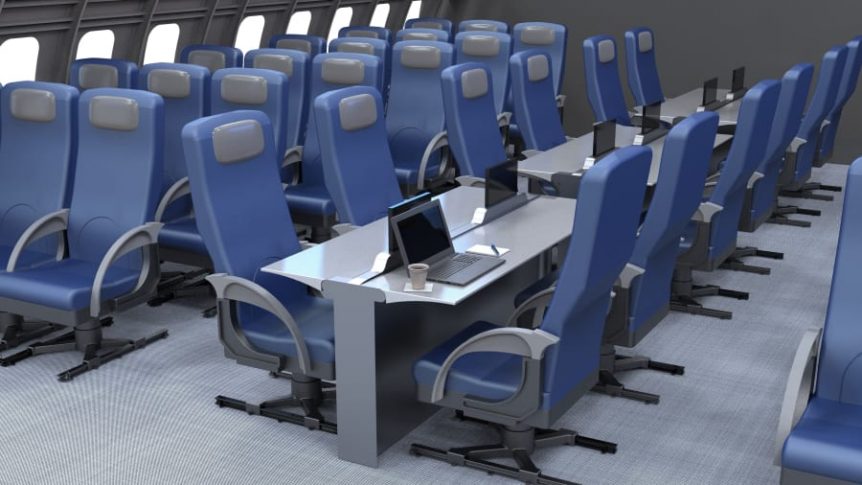Always accustomed to traditional aircraft interiors? This year’s Crystal Cabin Awards showcase cutting-edge aircraft cabin innovations, offering a glimpse into what’s evolving in passenger experience and aircraft design.
The 2020 awards spotlight futuristic, personalized, and hyper-connected cabin designs—alongside an electric commuter jet interior. Originally scheduled for March 2020 at the Aircraft Interiors Expo in Hamburg, Germany, the event was postponed due to the pandemic. Winners were finally honored this week in a virtual ceremony.
Carmen Krause-Bösterling, project director at the Crystal Cabin Award Association, noted the impact of COVID-19: “If air travel demand is to rise again, what is required now are assuring ideas that encourage passengers in the same measure. The award shows an industry’s response to these challenging times.”
Among the most intriguing concepts shortlisted was the ‘Flex Lounge’ by the Heinkel Group. This economy class design features a flexible seat row system. After takeoff, flight attendants can rotate seats so that passengers can face one another—turning rows into social pods and enhancing the onboard experience.
One major winner this year was Alice, the fully electric commuter jet from Israel’s Eviation Aircraft. Alice won the Cabin Concepts category for its clean-sheet interior that seats nine passengers and flies up to 1,000 kilometers. It features a unique reverse herringbone seating layout, giving each traveler a clear view of the windows and a sense of private space—a game-changing approach to electric jet interiors.
In the Visionary Concepts category, Airbus took honors with its ‘Airspace Cabin Vision 2020’. This design concept blends physical comfort with digital functionality, aiming to mirror the connected experience people enjoy on the ground. A standout feature: overhead luggage bins light up green or red, indicating whether they’re full or available—helping streamline boarding and reduce passenger stress.
Passenger comfort was also recognized in the Comfort Hardware category. The Modulair S economy seat from Safran Seats, developed with French university ENSCI, impressed with modular features like adjustable neck supports and integrated tablet holders. It’s designed to bring first-class customization to coach seating.
Another strong contender, the ROW1 seat by Ciara Crawford, made headlines for its inclusive design that accommodates standard wheelchairs—allowing them to move easily through narrow cabin rows, increasing accessibility in air travel.
Safran picked up two additional awards for advanced technologies. Its Bluetooth-enabled Inflight Entertainment System allows passengers to use their personal headsets, minimizing shared equipment—an especially timely innovation. The company also won in the Cabin Systems category for a smart trolley that collects real-time cabin data, improving service efficiency and logistics.
In the University category, the University of Cincinnati took top honors with a unique ‘coffee house’ cabin layout. This concept reimagines the business class workspace, creating an in-flight environment that better supports productivity and collaboration during travel.
While these awards celebrated already developed concepts, two more categories remain open. The Aircraft Interiors Expo in Hamburg, now rescheduled for August, is set to announce winners for the ‘Clean and Safe Air Travel’ and the ‘Judges’ Choice Award’—categories introduced in response to the pandemic’s ongoing influence on aviation.
These aircraft cabin innovations hint at a bold and adaptive future. From fully electric jets to digitally enhanced interiors and inclusive seating, the industry is pushing boundaries to make air travel safer, smarter, and more comfortable for every kind of passenger.
Photo Credit: Crystal Cabin Award

